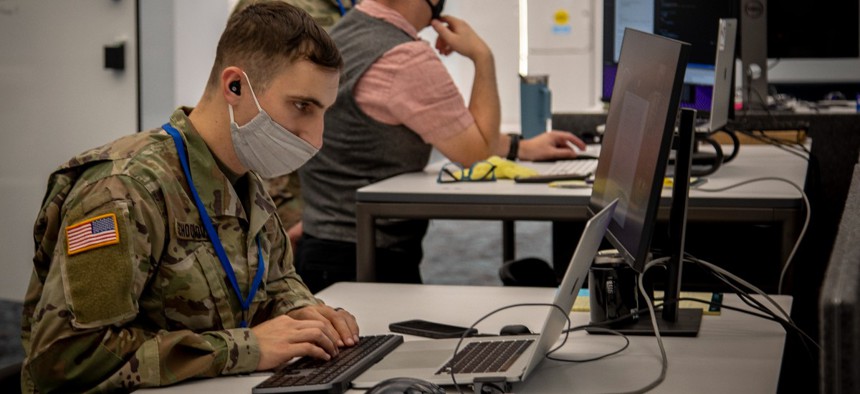Army Advocates More Funding for Modernization in Tech, Data and Weaponry

Army Futures Command's Software Factory operations taking place on March 22, 2021 in Austin, Texas. Luke J. Allen/U.S. Army
Officials testified before a Senate committee to ask for federal funding specifically to modernize and keep up with opponents like Russia and China.
Three officials from the U.S. Army testified before the Armed Services Subcommittee on Airland on Tuesday, discussing the modernization needs of America’s defense forces to keep up with adversaries like Russia and China.
Douglas Bush, the assistant secretary of the Army for Acquisition, Lieutenant General James Richardson, the Deputy Commanding General of the United States Army Futures Command, and Colonel Christopher Grice, the director of Materiel for the G-8, spoke before lawmakers on the additional resources needed to match opponents on the digital frontier.
They discussed the need to further the Army’s innovation in emerging tech spaces like artificial intelligence, robotics and cybersecurity, particularly within the Army Futures Command. This office oversees modernization projects and laboratories tangential to U.S. Army operations.
“Both China and Russia have committed to an increased pace and scope of military exercises, honing their joint warfighting capabilities,” the joint statement read. “The Army’s modernization efforts take these new realities into account as we define capability requirements and develop new concepts.”
The witnesses highlighted six areas of priority that need more modernization within the forthcoming 2023 National Defense Authorization Act, including long range precision fires, next generation combat vehicles, future vertical lift, network, air and missile defense and soldier lethality.
Chief among modernization needs for the Army is a digital overhaul. Richardson clarified that the Army Futures Command specializes in developing organizations and requirements within the military branch to oversee the introduction of emerging technologies. He confirmed some of the defense budget funding will go toward scaling new interoperable technologies and security architectures within the AFC.
“AFC is helping pave the way to a data centric army fully integrated into a data centric Joint Force,” he said. “We're working to fully implement common data standards and joint message formats in our requirements documents to ensure a systems approach among the army, Joint Force and our allies and partners.”
Senators on the committee, including Chairwoman Sen. Tammy Duckworth, D-Ill., and Ranking Member Sen. Cotton, Tom, R-AR, noted the U.S. Army’s budget has seen cuts or remained flat in its research and development funding and procurement. Cotton noted specifically that the Biden administration’s budget for the Army neither keeps pace with inflation nor with the modernization efforts of adversaries like China.
“We have a lot of work to do to ensure the army receives the resources it needs to modernize for the threats we face,” Cotton said.






